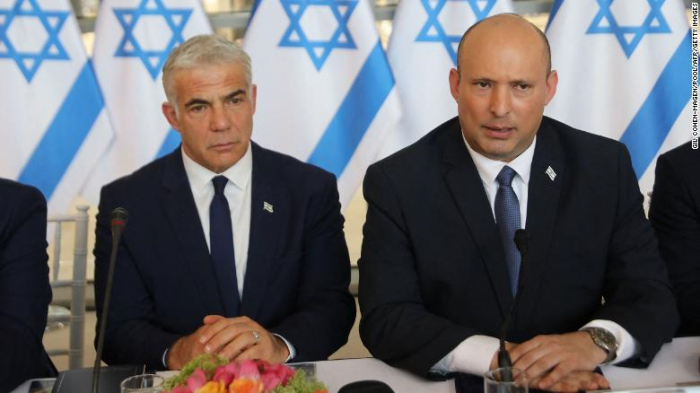The Israeli parliament, the Knesset, has voted to dissolve itself, triggering new electionsç CNN reported.
On Friday, Foreign Minister Yair Lapid will take over as caretaker prime minister under the terms of a coalition agreement made between outgoing Prime Minister Naftali Bennett and Lapid last year.
Thursday's 92-0 vote brings an end to Bennett's run as prime minister -- one of the shortest terms in Israeli history -- and gives former Prime Minister Benjamin Netanyahu a path to return to power.
New elections will be held on November 1 -- the fifth round of voting for Israelis in less than four years. Recent polling shows former prime minister Netanyahu's Likud party on track to win the most number of seats, but the polls do not show that his right-wing bloc will necessarily have enough seats to gain a parliamentary majority and be able to form a ruling government.
Bennett said on Wednesday that he will not run for re-election, saying it was "time to step back a little" and "look at things from the outside."
The coalition government had been teetering for weeks. But Bennett and Lapid's announcement last week that they wanted to dissolve their own government came as a total surprise.
"In the last few weeks, we did everything we could to save this government. In our eyes, the continuation of its existence was in the national interest," Bennett said earlier this month, standing alongside Lapid.
"Believe me, we looked under every rock. We didn't do this for ourselves, but for our beautiful country, for you citizens of Israel," Bennett added.
The Bennett-Lapid government was sworn into office in June last year bringing an end to Netanyahu's premiership, which had lasted more than 12 years.
Made up of no fewer than eight political parties, the coalition stretched right across the political spectrum, including for the first time an Arab party, led by Mansour Abbas.
United in a desire to prevent Netanyahu -- whose corruption trial had already begun in May 2020 -- from remaining in power, the disparate coalition partners agreed to put their substantial differences to one side.
Although it notched significant domestic and diplomatic achievements, it was internal politics that ultimately brought the coalition down.
Recent weeks have seen a number of coalition members either quitting, or threatening to quit, leaving the government without a majority in parliament to pass legislation.
The political impasse came to a head earlier this month, when a Knesset vote failed to uphold the application of Israeli criminal and civil law to Israelis in the occupied West Bank.
Among other things, the regulation, which comes up for renewal every five years, gives Israeli settlers in Palestinian territories the same rights as they have within Israel's borders, and is an article of faith for right-wing members of the coalition, including Prime Minister Bennett.
But two members of the coalition refused to support the bill, meaning it failed to pass.
Because parliament dissolved before the law expired on July 1, the regulation will remain in place until a new government is formed, at which time it will again go up for a vote.
CNN
More about:
















































